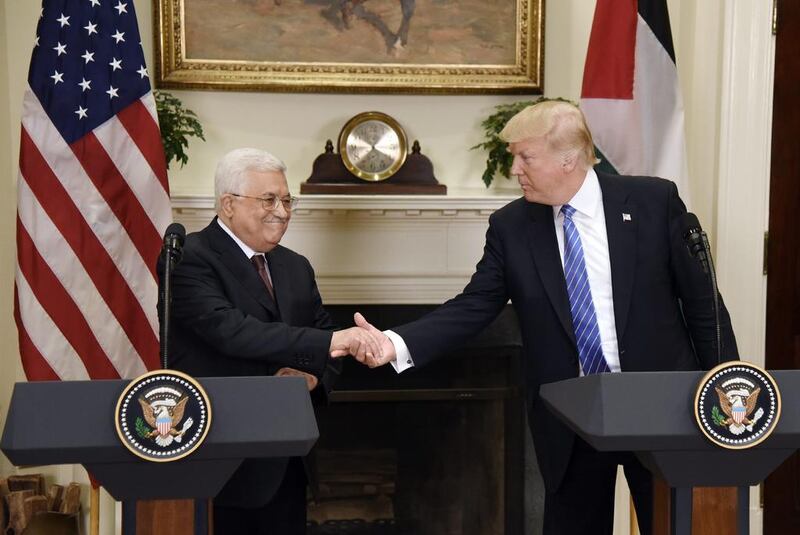NEW YORK // US president Donald Trump said on Wednesday he was confident he could broker a Middle East peace deal, telling Palestinian Authority leader Mahmoud Abbas at the White House that he wanted to prove an accord can be reached after seven decades of conflict.
Standing beside the Palestinian leader in the Roosevelt room on Wednesday, Mr Trump pledged, “We will get it done”. And as the president headed into a lunch with the Palestinian delegation, he said that a peace agreement between Israel and the Palestinians “is frankly, maybe not as difficult as people have thought over the years”, and that peace in Middle East was achievable within his lifetime.
“I have always heard that perhaps the toughest deal to make is the deal between the Israelis and the Palestinians,” he said. “Let’s see if we can prove them wrong.”
Mr Abbas responded with a bit of flattery for Mr Trump.
“Mr President, I believe that under your leadership and courageous stewardship, as well as your great negotiating ability, that with the grace of God and with all of your effort, we can be true partners to bring about a historic peace treaty,” Mr Abbas said. “Now Mr President, with you we have hope.”
Mr Abbas, 82, arrived at the White House for his first meeting with Mr Trump, hoping to persuade the US president to take a personal stake in the negotiations, said his spokesman Nabil Abu Rudeineh. He also planned to promote long-standing positions that Israeli prime minister Benjamin Netanyahu rejects, at a time when popular Palestinian support for negotiations with Israel has dwindled. But he expected to face pressure to end payments to the families of Palestinians in Israeli jails or killed in conflict.
US officials said it was one of a number of commitments needed to revive talks with Israel.
Otherwise, the beleaguered president of the Palestinian Authority brought familiar demands for an independent state along pre-1967 lines, with east Jerusalem as its capital.
After little progress in recent years, US and Palestinian officials hope an unconventional figure in the White House can bring fresh thinking to a stalled peace process.
The two leaders appeared together to deliver a message of hope before a working lunch.
As well as halting payments to families caught up in the conflict, US officials said they wanted Mr Abbas to agree to help stem anti-Israeli rhetoric among the general population and silence calls for violence as part of a raft of confidence building measures.
But any compromise will be difficult for a Palestinian leader whose mandate does not cover the entire territory and who is in danger of being outflanked by more militant figures.
The latest diplomatic push is all part of what senior White House figures hope will be an unconventional approach to finding peace.
On the eve of the meeting, HR McMaster, Mr Trump’s national security adviser, said a results-focused businessman might be better able to find a deal where seasoned Middle East experts have failed.
“The president is not a super-patient man,” he said. “Some people have described him as disruptive. They’re right.”
“And this is good,” he added. “Good because we can no longer afford to invest in policies that do not advance the interests and values of the United States and our allies.”
Observers fear the optimism will not last long.
Michael Wahid Hanna, senior fellow at the New York-based Century Foundation think tank, said the parameters of the conflict, the possible solutions and their pitfalls were all well known and that Mr Trump had little new to offer.
“This isn’t a situation where unconventional thinking can turn up new opportunities,” he said. So in that sense, those looking for a positive spin are still at the stage of irrational exuberance, but the stage of ‘actually, it’s complicated’ is still inevitable,” he said.
“Despite national security adviser McMaster’s comments about Trump’s approach being disruptive, the situation on the ground in terms of the politics of both sides and the actual physical reality of the settlement project make clear that no amount of disruption could possibly overcome such structural hurdles.”
Mr Abbas arrived in Washington with his personal standing and political capital in the doldrums. Palestinian elections are years overdue and he cannot even claim to represent Gaza, which is controlled by Hamas.
His position is further under threat from his rival Marwan Barghouti who is on hunger strike along with hundreds of other Palestinian prisoners in Israeli jails.
At the same time, trust between Palestine and Israel is at a low point.
Mr Netanyahu seems unwilling to compromise while he is fighting to keep his governing coalition together in the face of right-wing pressure.
In February, in a sign of his unrealistic approach, Mr Trump upended decades of American diplomacy by saying the two-state solution need not be the basis of a peace deal and that it was up to the two sides to find their own agreement.
Mr Trump’s campaign promise to move the US embassy from Tel Aviv to Jerusalem also angered Palestinians. Such a relocation would represent recognition of Jerusalem as the capital of Israel, before its status has been agreed in negotiations.
The US president has since distanced himself from that position although Mike Pence, his vice-president, said on Tuesday that Mr Trump was still giving “serious consideration” to the inflammatory idea.
During an event commemorating Israeli independence on the eve of Mr Abbas’s visit, Mr Pence promised Israel’s interests would be protected in any peace talks.
“Thanks to the president’s tireless leadership, momentum is building and good will is growing,” he said.
“And while there will undoubtedly have to be compromises, you can rest assured: president Donald Trump will never comprise the safety and security of the Jewish state of Israel. Not now, not ever.”
foreign.desk@thenational.ae





